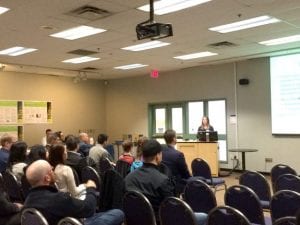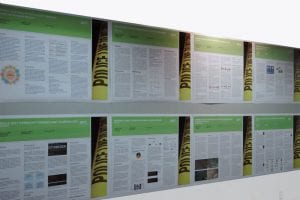June brought the annual Forensic Science and Technology BTech graduate research presentation day to Burnaby Campus, a showcase of the fascinating applied research happening in this varied – and often remarkable – area.

At what was essentially a mini-conference, 35 students presented to an audience of peers, faculty and staff, as well as industry guests, including representatives from various federal government ministries. Students selected their topics in the previous year, and worked on their projects throughout fall, winter, and spring terms. The projects offered an opportunity to explore a topic of interest in more depth and use some of the specialized skills acquired in the degree program.
“BCIT has the most comprehensive Forensic Science and Technology program of its kind in Canada, training a wide range of technologists for work in this critical field,” explains Dean Hildebrand, Associate Dean. “Research presentation day is always exciting because it shows the extent of our breadth and the variety of ways in which we touch important issues in our communities – and each year the quality of the student projects gets better and better.”
From a study that used municipal waste water to estimate local illegal drug use (it’s higher than we might think), to an analysis of Internet of Things (IOT) smart thermostat cybersecurity vulnerabilities, the projects were noteworthy with sometimes alarming results.
Crime and Intelligence Analysis student George Li’s work on geographic profiling has the potential to address the challenge of accounting for the influence of geographic features such as a lake on identifying a criminal’s location when using geo-profiling techniques.
Forensic Science Option student Cliff Lee’s project illustrated the ability to recover full DNA profiles from fingerprints that were developed using a ninhydrin solution. This study will help lay the foundation for future research that will attempt to recover DNA from fingerprints that have been exposed to a fire.

The depth and importance of some of the presentations is striking – and not just on campus. In the past students have gone on to publish their findings in peer-reviewed journals such as the International Association of Law Enforcement Intelligence Analysts’ Journal of Intelligence Analysis.
The research presentation day, now in its 5th year, provides excellent community-building and cross-disciplinary pollination, while showing what BCIT does best: train students to work in applied settings. In fact, many of the students are working while attending school part time, further honing skills they can use at work.